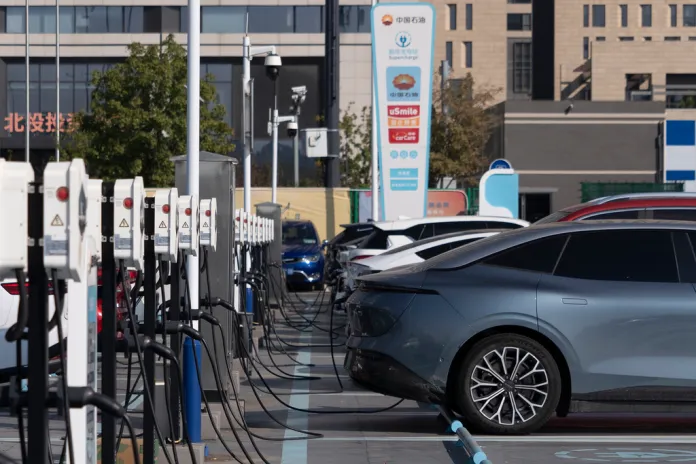Clean energy must overcome ‘climate change deniers’: Granholm – Washington Examiner
U.S. Energy Secretary Jennifer Granholm recently emphasized the Biden administration’s commitment to clean energy during a discussion at the Grace Hopper Conference in Philadelphia, the largest tech gathering for women and non-binary individuals. Granholm highlighted a shift towards federal support for clean energy, stating that the U.S. previously lacked a cohesive industrial strategy, which she believes is critical to overcoming challenges in the sector.
A major roadblock, according to Granholm, is the presence of climate change deniers, whom she sees as a significant hindrance to progress. While technical and permitting challenges are issues, she stressed the importance of addressing these attitudes to make headway. However, she did note improvements in Pennsylvania under the administration of Governor Josh Shapiro, who has successfully reduced permitting backlogs in the state.
Granholm also pointed out the immense economic potential in the clean energy sector, labeling it a $23 trillion opportunity, particularly through initiatives like the Bipartisan Infrastructure Law and the Inflation Reduction Act, which aim to enhance the U.S.’s leadership in climate-related technologies. The Department of Energy is actively supporting projects related to critical minerals, such as lithium in Pennsylvania, highlighting the evolving landscape of the energy industry and the investment opportunities it presents.
Clean energy must overcome ‘climate change deniers’: Granholm
(The Center Square) — U.S. Energy Secretary Jennifer Granholm praised the Biden administration’s action on energy and climate in Philadelphia on Thursday, emphasizing a new era of federal efforts.
“We haven’t had an industrial strategy in the United States to this point,” Granholm said. “Other countries have, and they put their thumb on the scale — understandably. We finally have our thumb on the scale.”
Speaking during a 12-minute fireside chat at the Grace Hopper Conference, which bills itself as the world’s largest tech gathering for women and non-binary people, she worried that the major hurdles for clean energy are not permitting delays and technological limits, but climate change deniers.
“One of the biggest hurdles we’re facing now is people who will deny that climate change is happening,” Granholm said. “To pretend it doesn’t exist or cause people to choose not to address climate change because they think it’s false is really doing such a huge disservice to this generation … we’ll get permitting reform through, we’ll surmount the technological challenges … I have huge faith in science that we will get through there. But can we address the difficult stuff between the ears?”
Though she didn’t speak of Pennsylvania specifically, the commonwealth has long struggled with permitting problems across all parts of its economy. Gov. Josh Shapiro has bragged of his administration reducing the permitting backlog in the Department of Environmental Protection by 60%, though the opportunity to make the process better remains.
The natural gas industry has long complained of permitting delays restraining its growth and state legislators have warned that Pennsylvania has an international reputation for delay.
The story doesn’t change for clean energy in the state, either. The queue for new energy generation in the PJM grid means producers can sometimes wait years for approval, even as the vast majority of those projects are for solar or energy storage projects.
Still, Granholm praised efforts to build a clean energy economy and urged diversification driven by efforts like the Bipartisan Infrastructure Law and the Inflation Reduction Act.
“Tech industry leaders: This is a $23 trillion opportunity to build and research, develop the products that are going to address climate change,” Granholm said. “It’s a huge opportunity for America to lead in particular technologies that, heretofore, might have been in other countries because of their industrial strategy.”
The Department of Energy has been prominent in supporting projects to rebuild America’s critical mineral industry. Lithium in Pennsylvania has drawn a lot of attention, as have a bevy of other minerals. Some estimate that critical minerals could be a $40 billion sector just from pulling them out of coal ash sites. Others, however, have been wary of federal subsidies for projects.
“The other countries, they are adopting strategies for industrial policy; this is such a huge market, there’s plenty of room for everybody, we want to make sure in the United States that we’re not losing out,” Granholm said. “Since the passage of the Inflation Reduction Act two years ago, over 900 factories have announced they’re coming or expanding in the United States to build this clean energy future … we had begun de-industrialization — now we are reindustrializing.”
That reindustrialization, however, has been mixed. The federal government has sent millions to a dozen tech hubs to encourage “high-potential clusters in 10 key technology areas,” places like Akron, Ohio and Reno, Nevada.
But investments for emerging industries like clean energy and semiconductors have trended toward the Sun Belt or greenfield cities like Columbus, Ohio. Rust Belt cities have been less attractive compared to tech hubs like San Francisco, Phoenix, or Austin.
" Conservative News Daily does not always share or support the views and opinions expressed here; they are just those of the writer."




